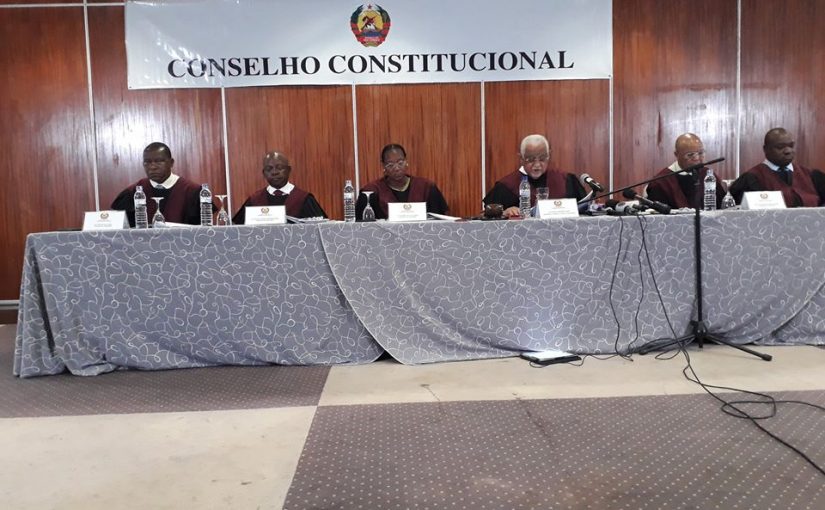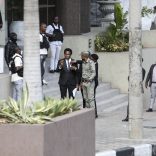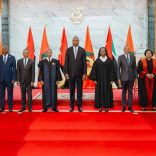Mozambique: Mondlane charged with "incitement to terrorism" - AIM report
Mozambique: CC hits legislators & parties; how donor strike caused election problems – Hanlon

Picture: CIP Eleições
Constitutional Council castigates legislators, parties and (implicitly) donors
In its ruling on the municipal elections, the Constitutional Council (CC) harshly criticised parliament, the political parties, and (implicitly) donors. The CC points out that the elections are covered by a overlapping mix of laws going back more than 20 years which have been repeatedly amended so some now contradict others. For example, law 2/1997 says that current mayors and assemblies remain in office until 7 February 2019 but law 7/2018 says the newly elected mayors and assemblies take office by 28 November 2018.
The CC notes that in 2009 it called for a single “electoral code” instead of a “multiplicity of laws … which are difficulty to interpret and apply”. The CC says such a code is now “urgently necessary” in order to end “the lack of stability and consolidation of electoral legislation [and] in order to avoid the approval of new legislation for each election.”
Ironically, it was the donors in 2010 who withheld aid to successfully force the government to ignore the CC demand for an electoral code, and to continue amending individual laws. (See more on this below.)
The CC ruling, published 14 November, is on http://bit.ly/LocElCC
Yet again, parties don’t know the law
The CC hits out at what it calls “the lack of concern about knowing and correctly applying the law, which is evident in political parties and candidates … continuing to make the same mistakes in each election. … Once again, it became clear that electoral contestants need to be aware of electoral legislation through training of their party agents and polling station delegates, in order to master the legal procedures that must be observed at the various stages of the process.”
Although the law sets out that the district and city courts also serve as the electoral courts in the first instance, “in the case of irregularities occurring during the voting and in the partial, intermediate and general tabulation, before being taken to district or city courts, a protest must first be made at the time and place where the act being challenged occurred,” the CC said. This is the principle of “earliest protest” (“impugnacao previa”). The CC notes that nearly all protests were rejected because of the failure to do this.
Similarly the law allows only 48 hours to go to the district or city court, and most protests were not submitted within 48 hours of the event. “When a deadline is fixed in hours, its count is continuous, hour by hour and minute by minute, without interruption, since the electoral process is very urgent,” the CC stressed.
Samito rejection ‘not what lawmakers intended’
Some candidates were rejected, “which public opinion attributed not to the legislature, but to the ill will of the law enforcers, headed by the Constitutional Council,” the CC complained. But in fact this came about because of the enforcement of the much amended laws. The 2013 law was improved in 2014, but the 2018 revision removed these improvements, the CC said. The result was “not what the legislators intended.”
The CC does not refer to it directly, but it is partly referring to the case of Samora Machel Jr (“Samito”) and his Ajudem citizens list in Maputo, which was initially accepted by the CNE but then when Frelimo pressed 4 candidates to withdraw after the deadline and new names could not be submitted, the list became too short, so the list was then rejected. This is correct in terms of article 23 of law 7/2018 as written. But this clause “allows a bad-faith manoeuvre” making it possible “to eliminate competitors even before the elections,” the CC said. “It is hard to imagine that such a situation was the intention of the legislator.” Yet “this is a law approved by consensus in parliament!” Very unusually, the CC uses an exclamation mark (!) to stress its annoyance that members of parliament were not paying attention.
“The legislator cannot unjustifiably appear as an obstacle to the exercise of the fundamental right to vote and to be elected, enshrined in Article 73 of the Constitution, as appears to happen with the current Electoral Law.” The CC continues: “in a State of Democratic Law where universal suffrage is a fundamental right (Articles 3 and 73 of the Constitution), in the electoral process all irregularities must be remediable, with the exception of those that, by the very nature of things, cannot be corrected, such as non-compliance with deadlines or candidates not on the voters roll.” Thus the law violates the constitution.
How the donors withheld aid to block an electoral code & force government to ignore CC
Donors withheld budget support aid for three months in 2009/10 to successfully force the government to ignore the Constitutional Council (CC) and civil society and reject plans for a unified electoral code. The continued mess with electoral legislation results from that donor success nine years ago.
In its judgement of the municipal elections published on 14 November, the CC reiterated that in its ruling on the 2009 elections (Acordao 30/CC/2009 of 27 December 2009) “it was emphasised that the multiplicity of electoral laws which, although regulating different elections, in a general way contain the same principles and general rules.” But because of the way that changes are made, piecemeal and in haste, there are inconsistencies. “Combined with deficiencies in the formulation of some norms, this makes it difficult for the interpretation and application by the various actors of the electoral processes. Therefore, the urgent need is to move towards a better systematisation and standardisation of electoral legislation as a whole, through a unified Electoral Code” covering all elections.
Civil society had supported the CC demand, and was proposing public hearings outside parliament to develop the electoral code. This had private and informal support from both Renamo and Frelimo. The political parties and civil society understood that political posturing within parliament, such as Renamo demands for veto power in the National Elections Commission, always delayed any settlement until the last minute. The civil society hope was that hearings outside parliament would build momentum for a less politicised electoral code closer to that in South Africa.
But major budget support donors disagreed. They saw the demand for a code as the delaying tactic. And there were personal issues. Some donors saw CNE president Joao Leopoldo as arrogant and biased toward Frelimo, and blamed him for excluding MDM candidates in some provinces. A key ambassador wanted electoral law revisions before he left Mozambique in August 2010 and thought that could only be done in parliament. Government ministers saw donors as arrogant, especially in the way they demanded immediate meetings.
The total budget support for 2010 was to be $472 million, up from $445 mn in 2009. The four largest budget support funders were the World Bank ($110 mn in 2010), the UK ($69 mn), the European Commission ($67 mn), and Sweden ($42 mn).
Budget support was withheld from mid-December 2009 until the end of March 2010 under a formal decision of the G-19, the group of 19 budget support donors at the time. But the World Bank and the European Union did not support the donor strike and released their money early, before mid-December, and thus did not need to disburse any in early 2010. Three small budget support donors – Portugal, Italy and Spain – also did not support the donor strike. But some of Mozambique’s oldest friends and larger budget support donors pushed for the strike in December 2009.
Serious negotiations began in March 2010, with government taking a hard line. There were initially 10 donor demands but donors agreed that 7 were met when Mozambique agreed to include some conciliatory words on governance in a final statement. Mozambique refused to concede on one of the biggest donor demands – an end to Frelimo party cells in government institutions. In exchange, it did concede on the other two. One was giving MDM in parliament (AR) the status of a party “bench” even though under internal regulations it had too few parliament members. (Frelimo had already planned to do this.) The other was to accept the donor demand that electoral legislation should remain as multiple laws and be resolved in parliament, and there should be no single electoral code and no non-parliamentary public hearings. Donors demanded and government agreed to reject a Constitutional Council ruling, and not have a unified electoral code. Government promised a package of draft law changes by July 2010.
As predicted by Mozambicans, the parliamentary route brought chaos. Renamo demanded “parity” in the electoral process; parity would mean that Renamo and Frelimo had equal status in the CNE and elsewhere, which Frelimo rejected. Delays in making even minor law changes forced a one-month delay of the 2013 municipal elections. Renamo boycotted the 2013 elections and resumed small scale military actions. Final changes to the various election laws were only approved by parliament in February 2014, and included substantial politicisation of the electoral machinery. But by then many of the ambassadors and aid officials who led the donor strike in 2010 had left, and did not see the result of their demand that the Constitutional Council and civil society be ignored. jh
Three articles on the donor strike were published at the time in Mozambique News Reports & Clippings (157, 159, 160; 8, 18, 26 March 2010) and the articles are collected together on http://bit.ly/2DsK3Of
CC confirms no protest possible for exclusion from count
The way the law is written makes it impossible for a party to protest its illegal exclusion from the district count, the CC confirmed in its ruling on a Renamo protest relating to Alto Molocue.
Renamo had protested that “The Renamo party agent was purely and simply prevented from participating in the intermediate count” and “the members of the District Election Commission nominated by Renamo, in addition to being prevented from taking part in the intermediate count, did not sign the minutes, nor were they given a copy of the document of the intermediate count, much less the time and place of publication of the results at the level of the municipality, nor was the results sheet posted in place of public access”.
Renamo took its case to the district court, which rejected it on the grounds of failing to make the “earliest protest” (“impugnacao previa”). The CC confirmed this was correct. It explained: “The Electoral Law prescribes that ‘representatives may be involved’ in the intermediate count, which means that participation is optional and not compulsory. … The inaction of the applicant and/or his representative in the participation in the intermediate count eliminates the possibility of being able to make a complaint.”
Thus the CC has confirmed that the Frelimo majority on a district elections commission can illegally exclude opposition-nominated members of the commission and opposition party agents, because they have no way to complain, because the complaint must be made at the meeting from which they are excluded.
Acórdão no 22/CC/2018 de 2 de Novembro is posted on http://www.cconstitucional.org.mz/Jurisprudencia/22-CC-2018












Leave a Reply
Be the First to Comment!
You must be logged in to post a comment.
You must be logged in to post a comment.